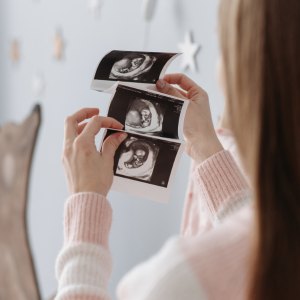So, you’ve just found out you’re 6 weeks pregnant — congratulations! This is such an exciting and emotional time, filled with questions and curiosity. At 6 weeks pregnant, your body is undergoing some incredible changes, and even though you might not see a visible baby bump just yet, big developments are happening behind the scenes. From hormonal surges to the first signs of your baby’s heartbeat, week 6 is a pivotal moment in your pregnancy journey.
If you’re feeling a bit overwhelmed or unsure about what to expect right now, you’re not alone. Many women experience a rollercoaster of emotions during this stage — it’s normal, and it’s okay. Whether this is your first pregnancy or your third, each experience is unique, and understanding what’s going on inside your body can bring a sense of clarity and calm.
In this post, we’ll walk you through everything you need to know about being 6 weeks pregnant — from what’s developing inside your womb to how it impacts your day-to-day life. We’ll also share helpful tips, common myths, and answers to FAQs so you can move forward with confidence. Let’s explore what it means to be 6 weeks pregnant!
Table of Contents
What is 6 Weeks Pregnant?
Being 6 weeks pregnant means it’s been six weeks since the first day of your last menstrual period (LMP). While conception likely occurred about two weeks later, healthcare providers count pregnancy from the LMP for consistency. At 6 weeks pregnant, your baby is still tiny — about the size of a lentil — but already undergoing rapid development.
During this early stage, the embryo is forming key organs, including the heart, which may start beating this week. The neural tube, which becomes the brain and spinal cord, is also closing. You might not look pregnant yet, but you’ll likely begin to feel early pregnancy symptoms such as fatigue, breast tenderness, and nausea.
This is also the time when many women take their first positive pregnancy test, as the hormone hCG is now present in detectable levels. Knowing what it means to be 6 weeks pregnant helps you stay aware, informed, and proactive about your health and your baby’s development.

Baby Development at 6 Weeks Pregnant
- Your baby is growing rapidly and is about 1/4 inch long — roughly the size of a lentil.
- The heart has started beating, often between 100–160 beats per minute, nearly twice as fast as yours.
- The neural tube, which will form the brain and spinal cord, is closing this week — a major milestone.
- Major organs like the liver, lungs, and kidneys are beginning to develop.
- Tiny limb buds are appearing, which will grow into arms and legs in the coming weeks.
- Facial features are starting to form, including small dark spots that will become eyes and nostrils.
- Though you can’t feel your baby moving yet, this is a critical stage of early development.
- It’s essential to take folic acid supplements now to help support healthy brain and spine development.
- Eating nutrient-rich foods ensures your baby gets the building blocks needed for healthy growth.
- These early changes lay the foundation for strong, healthy development throughout your pregnancy.

6 Weeks Pregnant Symptoms You Might Experience
At 6 weeks pregnant, your body is adjusting rapidly to support your growing baby, and those changes often come with noticeable symptoms. While every woman experiences pregnancy differently, here are the most common symptoms you might face during this week:
- Nausea and Morning Sickness: You may feel queasy, especially in the mornings, although it can happen any time of day. This is due to rising hCG levels.
- Fatigue: Feeling extremely tired is normal. Your body is working overtime, and progesterone is contributing to that sleepy feeling.
- Breast Changes: Your breasts may feel sore, tender, or fuller due to hormonal shifts preparing for milk production.
- Frequent Urination: Increased blood flow to the kidneys and uterus puts pressure on your bladder, making bathroom visits more frequent.
- Bloating and Mild Cramping: Your uterus is expanding, which may cause cramping and a feeling of fullness or bloating.
- Mood Swings: Hormonal changes can make you feel emotional, irritable, or unusually sensitive.
- Food Aversions or Cravings: You may suddenly dislike foods you once loved or crave things you normally avoid.
- Light Spotting (Sometimes): Known as implantation bleeding, light spotting can occur early on, but if it’s heavy or painful, contact your doctor.
Every symptom is a sign that your body is hard at work. If you don’t have many symptoms yet at 6 weeks pregnant, don’t worry — that’s normal too!
What to Eat at 6 Weeks Pregnant
Nutrition is key when you’re 6 weeks pregnant. This is the time to fuel your body with healthy, whole foods that support both your well-being and your baby’s growth.
Here’s what to focus on:
- Folic Acid: Crucial for brain and spinal cord development. Eat leafy greens, lentils, and fortified cereals.
- Protein: Supports tissue growth. Choose eggs, beans, lean meats, and tofu.
- Iron: Helps build blood volume. Add spinach, red meat, and dried fruits.
- Calcium & Vitamin D: Essential for bone development. Include milk, yogurt, and fortified plant-based alternatives.
- Hydration: Drink at least 8-10 glasses of water a day to reduce fatigue and support amniotic fluid levels.
- Healthy Fats: Omega-3s support brain development. Try salmon (limit intake to 2x a week), walnuts, and flaxseed.
Avoid processed foods, raw or undercooked meats, high-mercury fish, and unpasteurized dairy. Listen to your body — if you’re feeling nauseous, bland options like toast or crackers can help. Eating small, frequent meals will also keep your blood sugar stable and reduce morning sickness.

Meal Plan for 6 Weeks Pregnant Moms
Here’s a simple, balanced daily meal plan for 6 weeks pregnant moms to keep you nourished and energized:
Breakfast:
- Whole grain toast with avocado
- Boiled egg
- Glass of orange juice (fortified with calcium)
Mid-Morning Snack:
- A banana or an apple
- A handful of almonds
Lunch:
- Grilled chicken or chickpea salad with leafy greens
- Brown rice or quinoa
- Yogurt with berries
Afternoon Snack:
- Whole grain crackers with hummus
- Herbal tea (avoid caffeine)
Dinner:
- Baked salmon or tofu stir-fry
- Steamed veggies (broccoli, carrots, beans)
- Sweet potato
Evening Snack:
- Warm milk or a smoothie with chia seeds
This meal plan supports steady energy, the baby’s development, and helps curb nausea. If you’re craving odd things or feel queasy often, don’t worry — it’s normal at 6 weeks pregnant. Just do your best to stay hydrated and nourish your body daily.
How to Care at 6 Weeks Pregnant
Caring for yourself at 6 weeks pregnant means tuning in to your body and protecting your well-being. Here are key tips to help:
- Get Enough Sleep: Aim for 7–9 hours per night. Your body is working overtime, so rest is vital.
- Start Prenatal Care: Book your first doctor’s appointment, if you haven’t already. Blood tests and an early scan may be done.
- Avoid Harmful Substances: Say no to smoking, alcohol, and excessive caffeine. These can negatively affect fetal development.
- Move Your Body Gently: Short walks or prenatal yoga can improve blood flow, reduce stress, and boost your mood.
- Manage Stress: Use relaxation techniques like deep breathing, journaling, or listening to soothing music.
Being 6 weeks pregnant means you’re adjusting to major changes — physically and emotionally. Allow yourself grace, speak kindly to yourself, and take breaks when needed. Pregnancy is a journey, and caring for yourself now sets the tone for a healthier nine months ahead.
What to Do If You Suspect You’re Pregnant at 6 Weeks
If you think you’re 6 weeks pregnant but haven’t confirmed it yet, here’s what you should do:
- Take a Home Pregnancy Test: Most tests are accurate at this stage. Use your first-morning urine for best results.
- Contact a Healthcare Provider: Schedule an appointment to confirm the pregnancy and begin prenatal care.
- Start Taking Prenatal Vitamins: Even before confirmation, taking folic acid and iron is beneficial.
- Avoid Alcohol and Smoking: These can be harmful even in early pregnancy, so it’s best to stop immediately.
- Rest and Monitor Symptoms: Keep an eye on your body. Common signs at 6 weeks pregnant include nausea, breast tenderness, and fatigue.
It’s okay to feel unsure or anxious — early pregnancy can be emotional. Reach out for support from your partner, a friend, or a pregnancy support group. Once you confirm the pregnancy, you’ll have a clearer path forward and know how to care for both yourself and your baby.
Causes of Changes at 6 Weeks Pregnant
The dramatic changes happening when you’re 6 weeks pregnant are mostly caused by hormones, particularly human chorionic gonadotropin (hCG), estrogen, and progesterone. These hormones trigger the changes that support your growing baby and prepare your body for the months ahead.
For example, rising hCG levels are responsible for pregnancy symptoms like nausea and a heightened sense of smell. Progesterone relaxes the uterus but also causes bloating and fatigue. Estrogen contributes to increased blood flow and breast changes, helping prepare your body for breastfeeding later.
Meanwhile, your baby’s development is driven by genetic instructions from both parents, prompting cells to divide and form essential organs rapidly. You might also start feeling emotional or moody — that’s another effect of hormonal fluctuations, combined with the reality of becoming a parent. These causes of physical and emotional shifts are completely natural and show that your pregnancy is progressing as it should.

Benefits of Being 6 Weeks Pregnant
While early pregnancy can feel exhausting or even a bit confusing, there are several meaningful benefits to being 6 weeks pregnant:
- Early Connection: You may begin feeling more emotionally connected to your pregnancy. Knowing a tiny heartbeat may already be forming inside you can spark a deep sense of wonder and love.
- Health Monitoring: At 6 weeks pregnant, early checkups can detect any issues, allowing you to take action sooner. Early prenatal care is key for a healthy pregnancy.
- Increased Awareness: Your heightened senses and emotional intuition may prompt you to rest more, eat better, and prioritize self-care — all positives for both you and your baby.
- Hormonal Protection: The hormonal shifts that may be causing nausea or fatigue are also essential for sustaining the pregnancy and protecting your developing baby.
- Foundation for Growth: This week lays the groundwork for future development. Your baby’s neural tube is closing, major organs are forming, and the heart may start to beat — all vital steps in fetal growth.
Even though it may not always feel amazing to be 6 weeks pregnant, these benefits highlight the importance of this milestone and the powerful work your body is doing every single day.
How to Navigate Being 6 Weeks Pregnant
If you’re 6 weeks pregnant, you’re probably looking for guidance on how to manage this new chapter. Here are a few practical ways to care for yourself and your baby:
- Schedule Your First Prenatal Visit: If you haven’t already done so, now is the time to book your first appointment. Your doctor will confirm the pregnancy, calculate your due date, and schedule key tests.
- Take Prenatal Vitamins: Folic acid is especially important right now to support neural tube development. Look for a vitamin that includes iron, DHA, and calcium, too.
- Eat Nutritious Foods: Focus on whole foods like leafy greens, lean proteins, whole grains, fruits, and dairy. Avoid unpasteurized cheeses, raw fish, and high-mercury seafood.
- Stay Hydrated: Aim for at least 8-10 glasses of water daily to support increased blood flow and reduce pregnancy-related fatigue.
- Get Rest: Fatigue is common at 6 weeks of pregnancy. Make sleep a priority, and don’t feel guilty about taking naps.
- Manage Morning Sickness: Small, frequent meals can help. Ginger tea or crackers in the morning are simple remedies.
- Practice Gentle Movement: Walking or prenatal yoga can improve mood, circulation, and energy levels.
Remember, every pregnancy is different. What works for someone else might not work for you. Pay attention to your body’s cues and take things one day at a time. Being 6 weeks pregnant means caring deeply for yourself and the new life you’re nurturing — both deserve your full attention and care.
Common Myths About Being 6 Weeks Pregnant
When you’re 6 weeks pregnant, it’s easy to get lost in misinformation. Let’s clear up some common myths:
- Myth 1: You can’t feel anything this early.
False. Many women begin feeling fatigue, nausea, or emotional shifts as early as 6 weeks pregnant. - Myth 2: Morning sickness only happens in the morning.
Not true! Nausea can strike at any time of day — morning, noon, or night. - Myth 3: You should be showing already.
At 6 weeks pregnant, your uterus is still small, so visible baby bumps are rare. It’s normal not to “look” pregnant yet. - Myth 4: It’s too early to take precautions.
Actually, now is the perfect time to start building healthy habits. Your baby’s brain, heart, and other organs are developing rapidly.
Understanding the facts about being 6 weeks pregnant helps reduce stress and ensures you’re making informed choices during this crucial time.
Conclusion
Being 6 weeks pregnant is an incredible moment — one full of transformation, questions, and wonder. Even though your baby is just the size of a lentil, massive changes are unfolding inside your body. Hormones are working overtime, your baby’s heart is beginning to beat, and you’re setting the stage for months of beautiful development.
While this early stage can bring fatigue, nausea, and emotional ups and downs, it’s also a time for reflection and growth. The choices you make now — from nutrition and rest to emotional well-being — shape both your pregnancy journey and your baby’s health.
Remember, you don’t have to have everything figured out today. What matters most is taking small, meaningful steps toward self-care and awareness. You’re doing something amazing, and every day matters.
If you found this guide helpful or insightful, please share it with other moms-to-be, leave a comment, or subscribe to stay updated on each stage of pregnancy. Your journey at 6 weeks pregnant is just beginning, and we’re here with you every step of the way!
Frequently Asked Questions (FAQ)
Q1: What is 6 weeks pregnant in simple terms?
A: Being 6 weeks pregnant means it has been six weeks since your last period, and your baby is beginning early development, including heart and brain formation.
Q2: What causes changes at 6 weeks pregnant?
A: Hormones like hCG, estrogen, and progesterone cause physical and emotional changes, while your baby’s cells are rapidly dividing to form organs.
Q3: How can being 6 weeks pregnant improve my life?
A: It’s the beginning of a life-changing journey, prompting healthier habits, deeper emotional awareness, and early bonding with your baby.
Q4: Is 6 weeks pregnant scientifically proven to affect the body?
A: Yes. Studies confirm that significant hormonal and embryonic development occurs during the sixth week of pregnancy.
Q5: How long does it take to see changes at 6 weeks pregnant?
A: Many women begin experiencing symptoms like fatigue and nausea around this time, though some may not notice major changes yet.
Q6: Can anyone be 6 weeks pregnant, or does it vary?
A: Anyone who has conceived and is six weeks past their last period can be considered 6 weeks pregnant, regardless of symptoms.
Q7: What’s the best way to start caring at 6 weeks pregnant today?
A: Begin with prenatal vitamins, healthy eating, booking your doctor’s visit, and getting plenty of rest.







